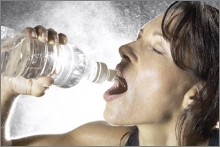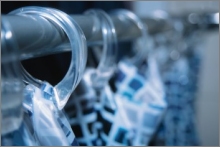Six New Studies Confirm Health Dangers of Plastic
by www.SixWise.com
The most up-to-date research shows that exposure to chemicals released from various plastic products and flame-retardant materials cause "adverse health effects in humans and laboratory animals." An entire section of the October 2008 issue of Environmental Research, "A Plastic World," was devoted to the results of a series of six environmental research studies.
|

Chemicals in plastic products you likely use everyday have been definitively linked to serious health problems including brain and reproductive damage and cancer.
|
These research studies investigated the health effects of chemicals such as bisphenol A (BPA), polyvinyl chlorate (PVC), phthalates, and polybrominated diphenylether (PBDE). Results showed that plastics contain "endocrine disrupting chemicals" that can interfere with the thyroid hormone, block the production of testosterone, and mimic the action of estrogen in your body.
These studies specified that fetal exposure to phthalates caused changes in male reproductive organs of humans and rats. Fetal exposure of rats and mice to BPAs and PBDEs showed a disruption in normal brain development and behavior. Research also provided evidence to show that great harm is being done to aquatic wildlife because our oceans are being polluted by enormous amounts of these plastic-related chemicals.
"For the first time a series of articles will appear together that identify that billions of kilograms of a number of chemicals used in the manufacture of different types of plastic can leach out of plastic products and cause harm to the brain and reproductive system when exposure occurs during fetal life or prior to weaning," according to Dr. Frederick vom Saal, guest editor of the "Plastic World."
|

PVC, a highly toxic chemical found in shower curtains, plastic piping, toys and building supplies, is not something you want in your home, particularly if you have small children or are pregnant.
|
This most recent research reported that prenatal exposure to rats, and exposure around the time of gestation to even small amounts of BPA led to abnormalities in the development of mammary tissue, which led to an increase in pre-cancerous lesions and mammary tumors. Adult exposure to BPA led to an increase in mammary tumors as well.
BPA mimics estrogen in the body. As a result of this, research involving cultures of human breast cancer cells showed that BPA causes changes in cell growth and proliferation as well as damage to cellular DNA -- potential precursors to cancer.
Some Facts About These Toxic Chemicals
|
Superior Water, Convenience, Safety and Zero Waste: The Wellness H2.O
 The Wellness H2.O enhanced water bottle is the next evolution in water technology. Not content with merely replacing wasteful bottled water, the Wellness H2.O combines the best portable filtration technology with rare Japanese stones and a patented enhancement process to produce an unparalleled quality of water. The Wellness H2.O enhanced water bottle is the next evolution in water technology. Not content with merely replacing wasteful bottled water, the Wellness H2.O combines the best portable filtration technology with rare Japanese stones and a patented enhancement process to produce an unparalleled quality of water.
- The ultimate environment product. Eliminates 1,100+ plastic bottles, reduces carbon emissions and conserves natural resources.
- Saves you up to $1,000 in bottled water purchases per year.
- The bottle is made of LDPE (low density polyethylene) plastic, which is BPA-free.
- Only bottle to produce nourishing, better-than-bottled-quality, "enhanced" water without the cost or waste associated with bottled water.
- Assures you and your family of safe and healthy water ... no matter where you go.
Order Your Wellness H2.O Now!
|
Protecting Yourself From Plastic
The safest way to prevent adverse health effects from these chemicals is to avoid exposure to the plastics and products that contain them.
-
Use glass and paper products instead of plastic.
-
Avoid drinking bottled water.
-
Replace toxic plastic products with safer plastics, such as bio-based materials.
-
Be aware that a "3" or a "V" stamped underneath the recycling symbol of your plastic product indicates that the product contains PVC.
-
Smell your plastic! PVC products give off a distinct odor from toxic gases being released, such as the smell from a vinyl shower curtain.
-
During the construction process -- when building a house, for instance -- make sure to avoid installing PVC plastic piping.
-
Choose only natural, phthalate-free personal care products.
Not only is bottled drinking water a source of the toxic chemical BPA, but it also has potentially more contaminants than regular tap water due to weaker regulations, and up to 40% of the time it actually is just bottled tap water. Consider using a safe water bottle with a portable water filter small enough to fit inside as an alternative. The Wellness H2.O enhanced water bottle provides a healthy solution to bottled water:
-
The ultimate environment product. Eliminates 1,100+ plastic bottles, reduces carbon emissions and conserves natural resources
-
Saves you up to $1,000 in bottled water purchases per year
-
Only bottle to produce nourishing, better-than-bottled-quality, "enhanced" water without the cost or waste associated with bottled water
-
Assures you and your family of safe and healthy water ... no matter where you go
Another option is to have purified drinking water at home. The Wellness Kitchen Water Filter provides the purest and most natural tasting water available. Its state-of-the-art filtration and enhancement technologies effectively reduce harmful contaminants, while at the same time enhancing the water with important wellness "ions and minerals" that your body needs. Consider grabbing a re-usable glass bottle -- just fill up with purified water from the Wellness Kitchen Filter and you're ready to go!
Recommended Reading
Is it Time to Give Up Bottled Water? The Facts, Marketed Illusions, and Health Risks You May Not Know About
Should You Ban Plastic Bags From Your Life: Six Reasons You May Want to Consider It
Sources
Breast Cancer Fund. Bisphenol A. October 2008.
Environmental Research, "The Plastic World," Volume 108, Issue 2, October 2008, Pages 127-130
EurekAlert.org October 2, 2008
United States Environmental Protection Agency. Pollution Prevention and Toxics. Polybrominated Diphenylethers (PBDEs). October 2008.